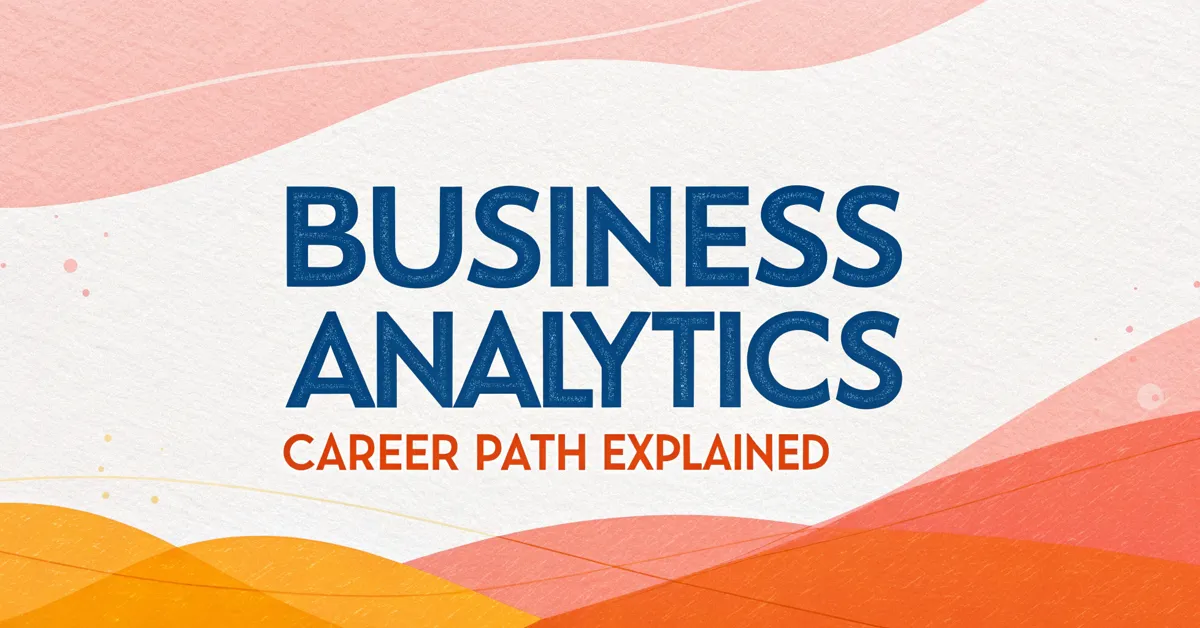Are you keen on steering your career toward the data-driven world? A career in business analytics might be just the ticket. Each year, this domain grows more popular. People hear about ways it can impact any kind of business. But you can avoid the vague notions. The following series of helpful hints will help you plan your career from start to finish. This article explains what you can do to enter this domain and thrive.
What Is Business Analytics?
Business analytics (BA) is the process of using data and statistical methods to gain insights that can inform business decisions. It’s more than just collecting data; it’s about analyzing it to find patterns, trends, and correlations. These insights can then be used to improve efficiency, optimize processes, identify new opportunities, and make better strategic choices.
Business analytics helps to:
- Make informed choices, supported by facts.
- Find new markets.
- Spot areas for improvement.
- Boost efficiency.
- Stay ahead of market shifts.
Why Choose a Career in Business Analytics?
If you love solving problems and have a flair for numbers, a job in business analytics can be a good fit.
Here are some strong reasons to consider this path:
- High demand: Businesses across all sectors are in search of data-savvy people who can aid them in making sense of their data. This strong demand translates into solid job security and chances for career growth.
- Good pay: Because of the demand, business analytics roles often come with a very good salary and benefits. As you gain experience and skills, your earning potential grows too.
- Varied work: You might find yourself examining sales data one week, studying customer behavior the next, and then predicting future market trends the week after. This variety keeps the work fresh and engaging.
- Impactful results: The insights you find will directly impact business choices, making a real change within your company. It’s satisfying to see your work turn into real-world results.
- Growth potential: Business analytics is a fast-changing field. This makes plenty of room for growth. You can gain new skills and stay on the cutting edge of this space.
Skills Needed for a Business Analytics Career
To excel in business analytics, you need a mix of hard and soft skills. Here are some important skills to develop:
Hard Skills
- Data analysis: This is the core skill. You need to be able to work with large datasets, clean and transform data, and find relevant information.
- Statistical analysis: Understanding statistical methods like regression analysis, hypothesis testing, and data modeling is important for drawing valid conclusions from data.
- Data visualization: You need to be able to show data insights in a clear and easy way. This often involves using tools like Tableau or Power BI to create charts, graphs, and dashboards.
- Programming: Knowing languages like Python or R can help you with data analysis and automation. These languages have rich libraries for data manipulation and statistical computing.
- Database management: You should be familiar with database systems like SQL. You need to know how to extract, load, and transform (ETL) data from various sources.
- Business intelligence (BI) tools: BI tools such as Tableau, Power BI, and Qlik Sense are often used to make dashboards. You should be good at these tools.
- Machine learning (ML): Basic knowledge of ML can be useful, especially for predictive analytics and creating data models.
Soft Skills
- Problem-solving: Business analytics is all about solving problems, so you need to be able to think critically and find creative solutions.
- Communication: You need to be able to explain complex data insights to people who don’t have a technical background. This involves strong written and verbal skills.
- Critical thinking: You need to be able to assess data objectively, find biases, and draw logical conclusions.
- Business acumen: Understanding how businesses work and how data can drive business goals is very useful for a job in business analytics.
- Teamwork: You will often work as part of a team, so being able to work well with others is essential.
Education and Certifications
While a specific degree isn’t always a must, having the right education and certifications can greatly boost your chances.
Here are some common educational backgrounds for business analysts:
- Bachelor’s degree: A bachelor’s degree in a quantitative field like statistics, mathematics, computer science, economics, or finance is a good start.
- Master’s degree: A master’s degree in business analytics, data science, or a related field can give you a more in-depth knowledge base and practical skills.
- Online courses and bootcamps: There are many online courses and bootcamps available that can teach you the basics of business analytics. These can be a good way to gain skills quickly or to supplement your existing education.
Important Certifications
- Certified Analytics Professional (CAP): The CAP certification shows you have the skills in analytics. It can lead to better jobs and pay.
- IIBA Entry Certificate in Business Analysis (ECBA): This certificate is for people just getting started. It shows you know the basics.
- Microsoft Certified: Data Analyst Associate: This certification is good for people working with Microsoft tools. It shows you can analyze data well.
Career Paths in Business Analytics
A career in business analytics offers a range of paths, each with its own focus and needed skills. Here are some common roles:
Business Analyst
Business analysts work as a bridge between IT and business teams. They find what a business needs and create solutions with data. They gather requirements, analyze data, and propose improvements to processes and systems.
- Key responsibilities:
- Finding business needs by talking to people and studying data.
- Putting requirements into documents that everyone can understand.
- Studying data to help with choices.
- Making models and diagrams.
- Skills needed:
- Good at talking to people.
- Knowing business processes.
- Good at analyzing data.
- Knowing tools like SQL and Excel.
Data Analyst
Data analysts focus on collecting, cleaning, and analyzing large datasets to find trends and insights. They use statistical methods and data visualization tools to communicate their findings.
- Key responsibilities:
- Gathering data from different sources.
- Cleaning data so it’s ready to use.
- Analyzing data with statistical methods.
- Making reports and graphs to show what they find.
- Skills needed:
- Knowing statistical analysis.
- Knowing SQL and Excel.
- Knowing data visualization tools like Tableau.
- Good at communicating.
Data Scientist
Data scientists use advanced analytical techniques, including machine learning and predictive modeling, to solve complex business problems. They build data products and algorithms that can automate decisions and improve business results.
- Key responsibilities:
- Making complex data models.
- Using machine learning algorithms.
- Finding new ways to use data.
- Building tools that use data to make choices.
- Skills needed:
- Good at machine learning.
- Knowing programming languages like Python.
- Knowing statistics.
- Good at communicating.
Marketing Analyst
Marketing analysts focus on analyzing marketing data to optimize campaigns, improve customer engagement, and increase sales. They track key performance indicators (KPIs), analyze customer behavior, and provide insights to improve marketing strategies.
- Key responsibilities:
- Studying marketing campaign data.
- Finding how to improve marketing campaigns.
- Looking at what customers do.
- Helping make better marketing strategies.
- Skills needed:
- Knowing marketing.
- Good at analyzing data.
- Knowing tools like Google Analytics.
- Good at communicating.
Financial Analyst
Financial analysts use data to evaluate financial performance, identify investment opportunities, and provide financial forecasts. They analyze financial statements, build financial models, and provide insights to support financial decision-making.
- Key responsibilities:
- Studying financial data.
- Making financial models.
- Helping with investment choices.
- Making financial forecasts.
- Skills needed:
- Knowing finance.
- Good at analyzing data.
- Knowing financial modeling.
- Good at communicating.
Operations Analyst
Operations analysts focus on improving operational efficiency and productivity. They analyze operational data, identify bottlenecks, and recommend improvements to processes and systems.
- Key responsibilities:
- Studying operations data.
- Finding how to make operations better.
- Improving processes and systems.
- Finding ways to make things more efficient.
- Skills needed:
- Knowing operations.
- Good at analyzing data.
- Knowing process improvement.
- Good at communicating.
Business Intelligence (BI) Analyst
BI analysts design and develop business intelligence systems and dashboards to help businesses track performance and make informed decisions. They work with data visualization tools to create interactive reports and dashboards.
- Key responsibilities:
- Making BI systems and dashboards.
- Helping businesses track performance.
- Making interactive reports.
- Showing data in an easy way.
- Skills needed:
- Knowing BI tools like Tableau.
- Good at data visualization.
- Good at analyzing data.
- Good at communicating.
Landing Your First Job in Business Analytics
It can be tough to land your first job in business analytics, but there are steps you can take to increase your chances:
Build a Strong Resume
- Highlight relevant skills: Make sure to showcase your skills in data analysis, statistics, programming, and data visualization.
- Include projects: List any data analysis projects you have completed, whether they are academic or personal projects.
- Show results: Where possible, quantify the results of your projects or experiences. For example, “Improved sales by 15% through data-driven marketing campaign.”
Network
- Attend industry events: Go to conferences, meetups, and workshops related to business analytics.
- Join online communities: Engage with other professionals on platforms like LinkedIn and Reddit.
- Reach out to alumni: Contact alumni from your school who are working in business analytics.
Gain Practical Experience
- Internships: Internships are a good way to gain real-world experience and make connections in the field.
- Freelance projects: Look for freelance data analysis projects on platforms like Upwork or Fiverr.
- Personal projects: Work on data analysis projects that interest you, such as analyzing sports data, financial data, or social media data.
- Contribute to open source projects: Help out in projects, such as adding to data analysis libraries in Python or R.
Prepare for Interviews
- Practice technical questions: Be prepared to answer questions about data analysis methods, statistical concepts, and programming.
- Be ready to explain projects: Be able to clearly explain your projects, the methods you used, and the results you achieved.
- Research the company: Understand the company’s business model and how data is used to make decisions.
- Ask good questions: Prepare questions to ask the interviewer to show your interest and engagement.
Tailor Your Application
- Customize your resume and cover letter: Tailor your resume and cover letter to each job you apply for, highlighting the skills and experiences that are most relevant to the position.
- Show enthusiasm: Show your passion for data and business analytics in your application and during the interview.
Tools Used in Business Analytics
To do well in business analytics, it’s vital to be good at different tools that help you examine and show data. Here’s a rundown of some main tools:
Data Analysis Tools
- Excel: It’s a standard tool for data analysis. You can use it to sort data and do simple statistics.
- SQL: SQL is a tool for talking to databases. It’s vital for taking out and organizing data for analysis.
- Python: Python is a coding language used in analytics. It has many libraries, such as Pandas and NumPy, which make data easy to work with.
- R: R is made for stats and data. It’s useful for people doing high-level statistical work.
Data Visualization Tools
- Tableau: Tableau helps you make easy-to-grasp charts and dashboards. These show the data simply.
- Power BI: Power BI, from Microsoft, is good for making reports that are interactive. These help people at all levels understand data.
- Qlik Sense: Qlik Sense helps users study data in many ways. It’s great for studying data in a fluid manner.
Big Data Tools
- Hadoop: Hadoop deals with storing big data across many machines. It’s the base for big data.
- Spark: Spark studies data quickly. It’s great for real-time data and machine learning.
Project Management Tools
- Jira: Jira helps teams track tasks. It is used to handle projects in data and analytics.
- Trello: Trello uses boards and cards. These let teams visually handle their tasks and projects.
Staying Ahead in Business Analytics
Business analytics is always changing, so it’s important to keep learning and growing.
- Continuous Learning:
- Take online courses to learn new skills and tools. Platforms like Coursera, Udemy, and edX have lots of courses for data and analytics.
- Read industry blogs, magazines, and books. Stay on top of the newest trends and best practices.
- Networking:
- Go to business analytics events to meet people and learn from experts.
- Join online forums and groups to share ideas and get help from peers.
- Certifications:
- Earn certifications in analytics tools like Tableau, Power BI, or Python.
- Projects:
- Do your own data projects. This helps you put what you learn into practice and builds your portfolio.
Challenges and How to Overcome Them
While a business analytics career is good, it also has problems. Being aware of these problems and knowing how to handle them can help you become a more effective analyst.
Data Quality Issues
Challenge: Data can be incomplete, inaccurate, or inconsistent, leading to incorrect insights and flawed choices.
Solution:
* Data cleaning: Use tools like SQL or Python to find and fix data errors.
* Data validation: Check data quality at its source.
* Data governance: Make rules for data collection and storage to ensure data integrity.
Communicating Insights
Challenge: It can be hard to communicate complex findings to people who don’t know the technical side, leading to misunderstanding or not using the insights.
Solution:
* Data visualization: Use tools like Tableau or Power BI to show data in an easy to understand way.
* Storytelling: Make a story with your data. Present your findings in a way that is easy to follow and engaging.
* Adjust to your audience: Know your audience and adjust your communication style to meet their needs.
Keeping Up with Technology
Challenge: New tools and technologies keep coming out, and it can be hard to keep up with the latest advancements.
Solution:
* Continuous learning: Take online courses, attend webinars, and read industry blogs to stay updated on new technologies.
* Experiment: Try out new tools and technologies to see how they can improve your work.
* Community: Join online groups and forums to learn from other professionals and share your knowledge.
Ethical Concerns
Challenge: Data analysis can bring up ethical issues, such as privacy concerns, bias in data, and the potential for misuse of insights.
Solution:
* Ethical frameworks: Follow ethical frameworks like the ACM Code of Ethics to guide your work.
* Transparency: Be clear about how data is collected, analyzed, and used.
* Bias detection: Be aware of bias in data and take steps to reduce it.
Data Security
Challenge: Protecting sensitive data from breaches and unauthorized access is key.
Solution:
* Access controls: Set up strict access controls to limit who can see sensitive data.
* Encryption: Encrypt data at rest and in transit to protect it from unauthorized access.
* Compliance: Follow data privacy regulations like GDPR and HIPAA to make sure you protect data.
The Future of Business Analytics
Business analytics is set to change a lot, driven by new tech and changing business needs. Keeping up with these changes is important for anyone wanting a successful career in the field.
- AI and Machine Learning Integration: AI and machine learning will keep being more important in business analytics, helping with automation, predictive modeling, and making better choices.
- Cloud Computing: Cloud computing makes it easier to store and study big data. Businesses are moving to cloud-based analytics solutions for better flexibility.
- Real-Time Analytics: Businesses want real-time insights to act fast. Real-time analytics tools will keep getting better.
- Explainable AI (XAI): There’s a growing need for AI systems that are clear and understandable. Explainable AI makes AI choices more open.
- Data Storytelling: Being able to tell stories with data will be more important. Analysts need to present insights in a way that is clear to everyone.
Is Business Analytics Right for You?
So, is a career in business analytics right for you? Think about your skills, interests, and career goals. If you like problem-solving, are good with numbers, and want to help businesses make good choices, business analytics might be a good fit. There are many ways to start, and there are good resources to help you succeed.
As you consider a career in business analytics, keep in mind that it offers chances for growth, impact, and ongoing learning. Embrace the challenges, stay curious, and see where this thrilling path can take you.















Leave a Reply
View Comments